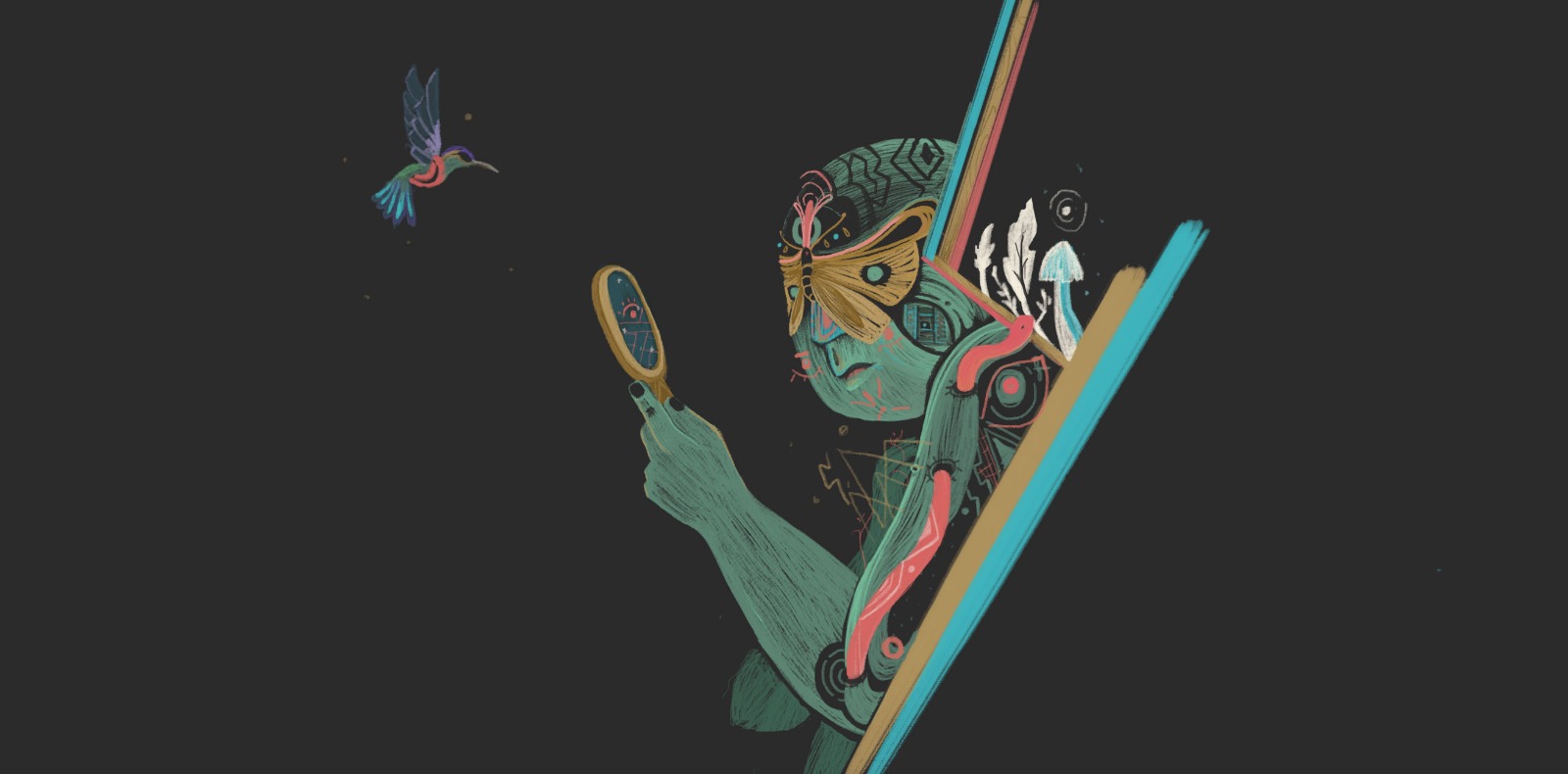I do not think it’s naïve to say that psychedelic substances have helped to build masculinities that are more sensitive to our environment and more willing to empathize with others.
There is no doubt that the growing interest in the use of psychedelic substances has triggered a wave of increasingly critical attitudes toward the neoliberal way of life and towards the social systems that shelter it, where the patriarchy is of major concern. Characterized by attitudes of domination, extractivism, and competition, the negative aspects of patriarchy as a social system become more evident from the perspective of a person under the extreme sensitivity of psychedelics. No wonder, then, that many of the groups of the so-called “new masculinities” that I have met are made up of a majority of people who use or have used these substances. I do not think it’s naïve to say that psychedelic substances have helped to build masculinities that are more sensitive to our environment and more willing to empathize with others.
However, in spite of this, the psychedelic community is plagued by scandals that involve the assertion of physical and mental abuse perpetrated by male facilitators and researchers. Far from being more sensitive or empathetic, some men even seem to build up notions of self-pride that foster sexualizing and abusive versions of themselves. For this reason, talking about masculinity and patriarchal behaviors within the psychedelic movement has become more necessary than ever before, as is talking about possible strategies to control their damage through self-critical and constructive approaches to masculinity.
As a response to what some may call a global masculinity crisis, it has become increasingly common in recent years to hear about movements of new masculinities, also called by some “healthy masculinities” or “conscious masculinities.”
As a response to what some may call a global masculinity crisis, it has become increasingly common in recent years to hear about movements of new masculinities, also called by some “healthy masculinities” or “conscious masculinities.” These groups seek to become a movement of non-hegemonic men developing in opposition to toxic, dominant, and violent masculinities and, although its existence goes back to the egalitarian sociology of the 60s and 70s, today, there are multiple approaches and perspectives. Overall, these groups lack cohesion and represent a vast terrain of contradicting opinions that have been unable to generate collective organization or sufficient force to transform a common reality. Nevertheless, at this point in time, these budding ideas also provide different potential avenues along which the movement can ultimately walk.
As an anthropologist, I have found in the groups of masculinities both ethnographic research material as well as a place of learning and reflecting about what it means to be (or not to be) a man. My first group of masculinities emerged in Mexico in an environment of human rights professionals and activists orientated towards issues of sexuality and gender equality. Our interest focused mainly on self-criticism and deconstruction of violent internalized attitudes. It was painful and often uncomfortable, but we grew through understanding the unconscious ways in which we exercise patriarchy in our daily lives. Our groups were built on dynamics of sharing and mediation circles, expressing our pain, admitting our frustrations, and denouncing our own sexualizing or violent behaviors, seeking among our peers advice that could help us heal and improve our practice of masculinity.
In Mexico, I also became familiar with the global organization Men Engage. This is a network of masculinities whose main objective is to speak out against the way in which men’s roles are scripted with violence. It takes a critical look at how violence is expected from men, while they are shunned for it at the same time, and how this affects every aspect of their lives, from interpersonal relationships to politics. When I moved to Europe and I was invited to other new masculinity groups, I was excited and motivated to see that the movement has gone global and was changing men all over the world. Yet, I was certainly confused by the stark difference that I experienced between the perspectives taken. I do see the value of the groups that I have encountered so far, but I think that the understanding of the conflict, and thus the direction taken, stem from very distinct cultural approaches.
These new experiences are mostly composed of middle class, white, Western men, coming together to pay homage to “sacred masculinity,” talking about the right to be vulnerable, and to remember that masculinity can be beautiful and emotional. Retreats with catchy names such as “Rebel Wisdom,” “Awakening Masculine,” or “The New Masculine Program,” are full of ayurvedic food, sexuality enhancing techniques, and coexistence dynamics that often point to losing the fear of being vulnerable among other men. In the end, it is true that one of the problems that we often experience within masculinity is our difficulty in sharing our feelings. However, I think it is naive to believe that this is the essential problem of masculinity.
Before going forward, I would like to note that I do not want to delegitimize these ideas: I really believe that it is important to talk about the masculine capacity to be vulnerable, and to create safe spaces where we can be sympathetic to each other and share our emotions. However, the deconstruction of patriarchy requires much more than building an altar for emotional and empathetic men. The work of new masculinities requires a sincere confrontation with the power imbalances between men and women, without feeling uncomfortable to explore the fact that there are places within us from which we exert power without being fully conscious of it. It requires us to be honest about how we exercise control and privilege through being men and, above all, it requires a work of deconstruction of the patriarchal attitudes that we take for granted in our daily life: extraction, projection, competitiveness, colonization, domination, etc.
As in the psychedelic movement, the new masculinity groups—and even more, the groups of the so-called “feminist men”—are riddled with scandals of sexual abuse and inappropriate behaviors towards women.
As in the psychedelic movement, the new masculinity groups—and even more, the groups of the so-called “feminist men”—are riddled with scandals of sexual abuse and inappropriate behaviors towards women. Clearly, belonging to a group of new masculinities does not guarantee an immediate evolution towards better versions of ourselves. I think it’s important to highlight this. Likewise, I think it is important to stop clinging to sensitivities around concepts such as “toxic masculinities.” In the end, it is not unreasonable to say that patriarchy is toxic, Western colonialism is toxic, and capitalist consumerism is toxic. These are the manifestations of compulsions and appetites that, as a society, we must learn to recognize, limit, and, eventually, dissolve. In the same way, masculinities tend to toxic behaviors that we as men have to learn to recognize, limit and dissolve, with the aim of balancing the power between men and women, as well as eliminating the intrinsic violence of war-like masculinity.
Groups of new masculinities that focus on generating a better self-perception of masculinity and on fraternal congeniality among men seem useful to me as self-help groups, but not necessarily effective in the creation of socially aware and responsible masculinities. The difference in approach between the new masculinities whose objective is gender equality and the deconstruction of patriarchy, and the new masculinities that seek to redefine masculine identity through sensitivity and the loss of anger, is important to point out. While the first approach explores the privileges and burden that arise from being a man in society, the other seeks to improve the capacity of emotional expression and the way of relating among men through quasi-spiritual therapeutic approaches. Both of these approaches have valid objectives. Nevertheless, only the first approach actually allows for open self-criticism, because of its focus on the analysis of the issues that revolve around masculinity. Moreover, it is relatively common for this approach to hurt “male sensibilities”; precisely because it is not easy to admit the problems that we are part of when we exercise our privileges.
If we have grasped anything in recent years, it is that, although the psychedelic experience has an immense transforming potential, capable of producing experiences of spiritual emergence and greater empowerment, this is, however, not immediately synonymous with “better human beings.”
The lessons learned in the new masculinities movements have much in common with the lessons we must learn in the psychedelic community. If we have grasped anything in recent years, it is that, although the psychedelic experience has an immense transforming potential, capable of producing experiences of spiritual emergence and greater empowerment, this is, however, not immediately synonymous with “better human beings.” As mentioned before, there are already too many cases of self-proclaimed facilitators and shamans who, regardless of the number of accumulated psychedelic experiences, persist in behaviors of abuse, arrogance, and domination; that is, primordially patriarchal behaviors.
Regardless of the intensity of the spiritual emergency, psychedelics do not guarantee critical reflection. Although they definitely facilitate opening the door to self-reflection, without seriously working on analyzing our compulsions, our fears, and our anger, the psychedelic experience runs the risk of remaining a mere aesthetic appreciation of altered states of consciousness, without necessarily changing the way we exercise that consciousness. Being part of groups that highlight the spiritual experience and facilitate human expression can be used as a green-washing of the conscious kind, or what the author and academic Monica Emerich calls a “spiritual-washing,” through which people assume a personal evolution only because they participate in dynamics or buy products that have the stamp of “spiritual awareness.” The ceremonies with sacred plants and with affective group dynamics become apparent guarantors of a better human quality; but, with a lack of self-critical content, lasting change is unlikely.
The psychedelic masculinities, like other masculinity movements, need to maintain self-reflective and deconstructive stances on patriarchal, consumerist, extractive, colonialist, and neoliberal behaviors that have put at risk the integrity of hundreds of indigenous cultures, the environment, and the right of women to live in an equal society. Otherwise, they simply become spaces to feel better about ourselves and our immediate reality. This reflection is not only limited to masculinities; although, in terms of privilege and violence, we have a lot to work on. My way of perceiving a truly responsible psychedelic movement is one that uses psychedelic substances for personal work in questioning our privileges and biases. If we are white, we must give space to reflect on our race privilege and meditate on how we can be part of an effective decolonization. If we have enough money, we have to allow a space for critical analysis of our class privileges and reflect on how we can help generate sustainable modes of existence. If we are men, it is our responsibility to admit our gender privilege and submit ourselves to a self-critical analysis to diminish our violent, macho, and competitive behaviors, aiming to build truly egalitarian societies.
Using psychedelic substances to heal ourselves and our society also requires our commitment to work on and change all those behaviors established when we exercise our privileges.
Using psychedelic substances to heal ourselves and our society also requires our commitment to work on and change all those behaviors established when we exercise our privileges. Whether we like it or not, every process of healing and evolution brings its own sacrifices, and one of the greatest sacrifices is, without doubt, the critical, reflective, and sometimes painful analysis of those aspects of ourselves that allow us to exercise power over others.
Art by Karina Alvarez.
Take a minute to browse our stock:
Did you enjoy reading this article?
Please support Chacruna's work by donating to us. We are an independent organization and we offer free education and advocacy for psychedelic plant medicines. We are a team of dedicated volunteers!
Can you help Chacruna advance cultural understanding around these substances?














